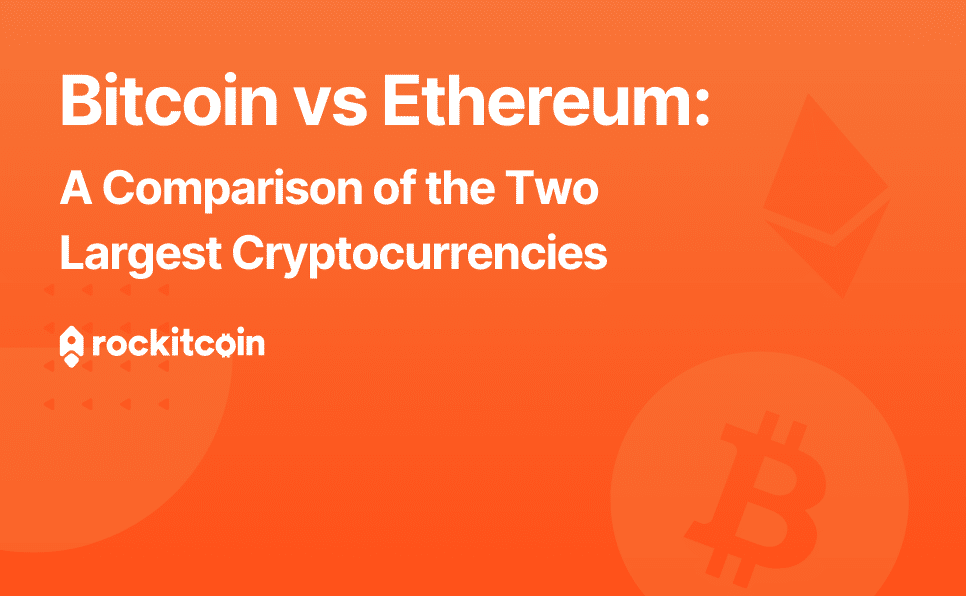In the ever-growing world of cryptocurrency, two names often dominate the conversation: Bitcoin and Ethereum. While Bitcoin is known as the original cryptocurrency and Ethereum is its closest competitor, these two digital assets serve different purposes and attract different types of investors.
As a leading Bitcoin ATM provider, RockItCoin offers both Bitcoin and Ethereum for purchase at our ATMs. But before diving in and making a purchase, it’s essential to understand the differences between these two powerhouse cryptocurrencies. This guide will provide a comprehensive comparison of Bitcoin vs Ethereum, exploring their unique purposes and technologies. Whether you’re looking to invest, spend, or build on blockchain, this guide will help you understand the difference between the two.
What Is Bitcoin?
Bitcoin, launched in 2009 by an anonymous individual or group known as Satoshi Nakamoto, is the world’s first cryptocurrency. Bitcoin was created to provide a peer-to-peer decentralized currency that would allow individuals to transfer value securely without relying on a central authority like a bank or government.
At its core, Bitcoin functions as a store of value and medium of exchange. Many people consider Bitcoin to be “digital gold” because it shares characteristics with precious metals like gold—it is scarce (with a maximum supply of 21 million coins), can be used as a hedge against inflation, and holds intrinsic value as an asset.
Bitcoin operates on its own blockchain, which records all transactions ever made in the network. The Bitcoin blockchain is known for its security and transparency, and it uses a consensus mechanism called Proof of Work (PoW). In PoW, miners compete to solve complex mathematical problems to validate transactions, and in return, they are rewarded with newly minted Bitcoin.
Bitcoin’s simplicity has contributed to its popularity. It doesn’t aim to do more than act as a decentralized currency, and that’s part of its appeal. It’s used for everything from buying coffee to international remittances, and its decentralized nature means no government or organization controls it.
What Is Ethereum?
Ethereum was created in 2015 by Vitalik Buterin and a team of developers who sought to push the boundaries of blockchain technology beyond just currency. While Bitcoin focuses solely on being a decentralized currency, Ethereum is designed as a decentralized platform that enables developers to create and deploy decentralized applications (dApps) using smart contracts.
Smart contracts are self-executing agreements where the terms of the agreement are written directly into lines of code. This allows for decentralized applications to run exactly as programmed without any chance of censorship, fraud, or third-party interference. Ethereum’s native cryptocurrency, Ether (ETH), is used to pay for transactions and computational services on the network.
In addition to powering smart contracts and dApps, Ethereum has become a foundation for Decentralized Finance (DeFi), Non-Fungible Tokens (NFTs), and token creation (ERC-20 tokens). Ethereum’s flexibility and innovation have made it a crucial part of the broader blockchain ecosystem.
Unlike Bitcoin, Ethereum does not have a fixed supply. However, Ethereum 2.0 (aka “The Merge”, a major upgrade to the network, has introduced mechanisms that aim to reduce the issuance of new Ether and make the network more scalable, secure, and sustainable by transitioning from Proof of Work to Proof of Stake (PoS).
Key Differences Between Bitcoin and Ethereum
Purpose and Use Cases
The primary difference between Bitcoin and Ethereum lies in their intended use cases.
Bitcoin was created to be a digital currency and store of value. Its main purpose is to facilitate the transfer of wealth in a decentralized manner. Bitcoin is increasingly seen as a long-term investment, often referred to as “digital gold,” and a hedge against inflation.
Ethereum, on the other hand, was designed to be a decentralized platform for creating and running smart contracts and dApps. While Ether (ETH) is also a digital currency, its main use is to power applications on the Ethereum network. Ethereum’s smart contract functionality allows developers to build innovative applications like DeFi protocols, NFTs, and decentralized exchanges (DEXs), positioning Ethereum as the backbone of Web3.
Blockchain Technology
Bitcoin and Ethereum both use blockchain technology, but they’re structured differently.
Bitcoin has a more straightforward blockchain, primarily designed to be a ledger that records transactions securely and immutably. Its simplicity is what makes it secure, but it limits what the network can do beyond handling basic transactions.
Ethereum’s blockchain is much more versatile, supporting not just financial transactions but also smart contracts and dApps. Ethereum’s programming language allows developers to write complex logic into the blockchain, enabling an entirely new world of decentralized applications.
Consensus Mechanism
Bitcoin uses the Proof of Work (PoW) consensus mechanism. In PoW, miners compete to solve cryptographic puzzles to validate transactions, which requires significant computational power and energy. While PoW is very secure, it’s also criticized for being energy-intensive.
Ethereum initially used PoW but has transitioned to Proof of Stake (PoS) with the launch of Ethereum 2.0. In PoS, validators are chosen based on the number of coins they hold and are willing to “stake” as collateral. PoS is considered more energy-efficient and faster than PoW, and it reduces the environmental impact of blockchain validation.
Transaction Speed and Fees
Bitcoin transactions are relatively slow, with an average block time of around 10 minutes. As the network (and mempool) becomes more congested, transaction fees can increase significantly, making it less practical for smaller, everyday payments. Bitcoin transaction times can also increase due to network congestion.
Ethereum has faster block times (about 12-15 seconds) and can handle more transactions per second. However, during periods of high activity, Ethereum gas fees (transaction fees) can skyrocket due to network congestion. Ethereum developers are working on scalability solutions like layer-2 protocols and Ethereum 2.0 to reduce fees and increase transaction capacity.
Market Perception
Much like gold, investors consider Bitcoin a store of value and a hedge against inflation. Bitcoin’s limited supply and long track record give it a perception of stability in the often volatile world of cryptocurrency.
Ethereum, while also an investment, is seen as a platform for innovation. Ethereum is at the center of blockchain development, powering sectors like DeFi, NFTs, and decentralized applications.
How to Buy Bitcoin and Ethereum at RockItCoin ATMs
If you’re ready to get started with Bitcoin or Ethereum, RockItCoin offers a quick and easy way to purchase both. Our Bitcoin ATMs allow you to buy either cryptocurrency with cash, making it simple for anyone to get involved in the world of crypto.
Here’s how to buy Bitcoin or Ethereum at a RockItCoin ATM:
- Use our ATM locator to find the nearest RockItCoin ATM.
- At the ATM, choose the cryptocurrency you want to buy—Bitcoin or Ethereum.
- Follow the on-screen instructions to complete the transaction.
- Once your transaction is complete, you’ll get a receipt and your Bitcoin or Ethereum will be transferred to your wallet within 15-30 minutes.
It’s that easy! Whether you’re just starting or adding to your portfolio, RockItCoin makes it simple to buy Bitcoin and Ethereum at our nationwide ATMs.
Buy Bitcoin & Ethereum at an ATM Near You 🡢
Conclusion
While Bitcoin and Ethereum are both leading cryptocurrencies, they serve different purposes in the digital economy. Bitcoin’s strength lies in its role as a store of value and medium of exchange, while Ethereum’s versatility and smart contract capabilities make it the foundation for decentralized applications and blockchain innovation.
Whether you’re interested in Bitcoin’s or Ethereum, both are well-known options. And thanks to RockItCoin’s ATMs, getting started with Bitcoin or Ethereum is easier than ever.
Visit a RockItCoin ATM today to buy Bitcoin or Ethereum and take your first step into the world of cryptocurrency!
The information provided in this blog is for educational and informational purposes only. It is not intended as financial, investment, or legal advice. Cryptocurrency investments are speculative and involve significant risk. Always do your own research and consult with a professional financial advisor before making any investment decisions. RockItCoin does not guarantee any specific outcomes, and the value of cryptocurrencies can fluctuate.








